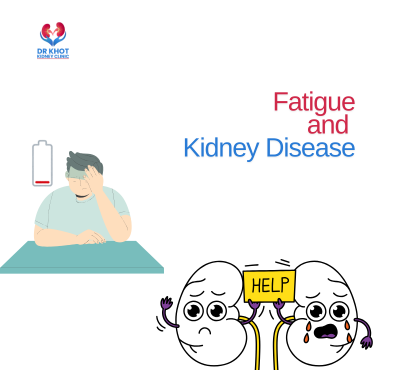Fatigue is one of the most common yet overlooked symptoms of chronic kidney disease (CKD), affecting up to 91% of patients. Many patients suspect aging or stress, but when fatigue lingers with other signs like swelling, blood pressure issues, or anaemia, kidney dysfunction may be key. This blog explores how kidney disease drains your energy, why fatigue matters, and how to regain vitality—even while managing kidney conditions.
How Kidneys Cause Fatigue
A. Build-up of Toxins (Uremia)
When kidneys fail to filter waste, uremic toxins accumulate and affect brain function, muscles, and overall energy .
B. Anemia Due to Low Erythropoietin
Healthy kidneys produce erythropoietin (EPO), which stimulates red blood cells. CKD causes EPO decline → anaemia → poor oxygen transport → persistent tiredness .
C. Chronic Inflammation & Hormone Imbalance
CKD triggers persistent inflammation and hormonal shifts → muscle breakdown, weakness, low mood, and fatigue .
D. Sleep Disorders
Fluid overload, restless legs, and sleep apnea are common in CKD, disrupting sleep and worsening fatigue.
E. Dialysis Impact
Dialysis patients often face residual fluid imbalances, nutrient losses, and fatigue due to treatment intensity
3. Recognizing Fatigue Symptoms
- Constant low energy despite rest
- Difficulty concentrating, brain fog
- Shortness of breath or rapid exhaustion from light tasks
- Muscle weakness or cramps
- Poor sleep quality, frequent waking
- Decreased interest in activities
Consider evaluating kidney function if fatigue persists alongside early signs of CKD (swelling, high BP, frequent urination)
Diagnosing the Cause
- Kidney tests: Serum creatinine, eGFR, urine albumin
- Anaemia test: Haemoglobin, ferritin, iron
- Inflammatory markers: CRP
- Sleep studies if sleep apnea/RLS suspected
Managing Fatigue in Kidney Disease
A. Treat Anemia
- EPO injections, iron supplements improve energy even with mild CKD-induced anemia
B. Optimize Dialysis (if needed)
- Adjust schedules, dialyzers to reduce toxin buildup and fluid overload
C. Nutrition & Hydration
- High-quality protein, low phosphorus diets; correction for imbalances
- Enough yet controlled hydration
D. Physical Activity
- Gentle exercise builds muscle and combats fatigue
E. Improve Sleep Quality
- Sleep hygiene, fluid management, CPAP if needed
F. Treat Underlying Conditions
- Manage diabetes, hypertension, depression
G. Medications for Symptom Relief
- Manage restless legs, insomnia
Lifestyle Tips for Indian Patients
- Gentle morning walks or yoga (Surya Namaskar)
- Iron-rich (moong dal, spinach) + vitamin C foods
- Adequate water intake with portion control
- Monitor BP regularly
- Encourage social/sleep routines for mental health
Communicating with Your Doctor
Mention fatigue along with:
- Swelling
- Urination changes
- Shortness of breath
- Cognitive changes
Request tests for kidney function, anemia, sleep issues. Managing any decline in kidney health early helps relieve fatigue.
Fatigue in kidney disease isn’t laziness—it’s a real symptom driven by toxin buildup, anemia, inflammation, and sleep disruption. A comprehensive, holistic approach involving medical treatment, nutrition, exercise, and sleep intervention can meaningfully restore vitality. Start the conversation with your nephrologist—energy can be regained!
FAQ
Q1. When is fatigue serious enough to test kidney function?
If fatigue is ongoing for weeks, combined with fluid retention, high BP, or anemia, ask for a basic kidney panel (eGFR, creatinine, urine albumin).
Q2. Will anemia correction remove fatigue instantly?
Treating anemia often significantly improves energy, but full recovery may take weeks. Restoring iron stores, adherence‑based EPO, and managing inflammation are key.
Q3. Can lifestyle fixes like exercise make a difference?
Yes—graded workouts and sleep hygiene reduce inflammation, build endurance, and provide sustained improvements in energy among CKD patients
When to Seek Help
- Sudden increase in fatigue
- Chest pain or breathlessness
- New swelling or frothy urine
- Uncontrolled BP
- Sleep problems affecting quality of life
Early specialist consultation can prevent CKD progression and restore quality of life.

